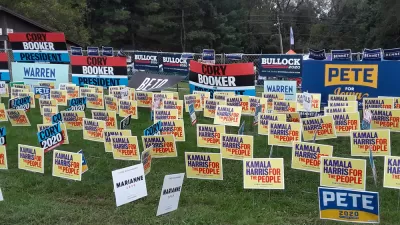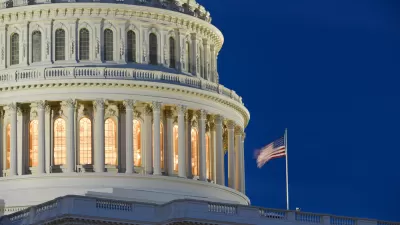The Trump Administration is sending out mixed signals on public transit issues. Why?

In its first week, the Trump Administration sent mixed signals on transportation issues. Part of the Trump transition team is drafting a budget, and some leaks suggest that this budget will include large spending cuts in a wide variety of federal programs. Apparently, early budget drafts are based on the Heritage Foundation’s budget proposals. Since Heritage wants to wipe out funding for public transit, it is possible that the Trump budget could support similar policies.
On the other hand, the transition team has been working with a list of infrastructure projects that the incoming Trump Administration might support. [Ed's note: the veracity of this draft list has been disputed, but McClatchy has since verified the exact origins of the list.] Even though the list includes road and air projects, it also includes:
- High-speed rail between Houston and Dallas;
- Commuter rail from Dallas to Fort Worth;
- Expansion of New York City's new Second Avenue subway;
- The Purple Line, a light rail line running through Washington’s suburbs;
- Detroit’s M-1 streetcar projects; and
- Extensions of Boston's Green Line trains.
What's going on? Since the Trump campaign speculated about public-private partnerships, it might be the case that the Trump Administration likes transportation as long as it is financed in nontraditional ways. And if we had a conventional President, who expected to win the election and whose transition team had been in place long before the election, this version of reality would seem persuasive to me.
But it seems to me that this administration might be a bit more disorderly than most. I'm not sure that President Trump ever expected to win the election, and transition head Chris Christie was fired a few days after the election. He was replaced by Vice President Pence, who seems to be a more orthodox, anti-government conservative than President Trump.
Under the circumstances, it might be the case that groups within the transition team aren't really speaking to each other, and so the anti-government types in "Office A" haven't coordinated their proposals with the infrastructure-lobby types in "Office B." Ultimately, President Trump may have to arbitrate disputes between his administration's moderate and conservative wings—and then Congress will have to decide to what extent it should uphold his verdict.

Planetizen Federal Action Tracker
A weekly monitor of how Trump’s orders and actions are impacting planners and planning in America.

Maui's Vacation Rental Debate Turns Ugly
Verbal attacks, misinformation campaigns and fistfights plague a high-stakes debate to convert thousands of vacation rentals into long-term housing.

Restaurant Patios Were a Pandemic Win — Why Were They so Hard to Keep?
Social distancing requirements and changes in travel patterns prompted cities to pilot new uses for street and sidewalk space. Then it got complicated.

Charlottesville Temporarily Has No Zoning Code
A judge ordered the Virginia city to throw out its newly revised zoning code, leaving permitting for new development in legal limbo.

In California Battle of Housing vs. Environment, Housing Just Won
A new state law significantly limits the power of CEQA, an environmental review law that served as a powerful tool for blocking new development.

Boulder Eliminates Parking Minimums Citywide
Officials estimate the cost of building a single underground parking space at up to $100,000.
Urban Design for Planners 1: Software Tools
This six-course series explores essential urban design concepts using open source software and equips planners with the tools they need to participate fully in the urban design process.
Planning for Universal Design
Learn the tools for implementing Universal Design in planning regulations.
Heyer Gruel & Associates PA
JM Goldson LLC
Custer County Colorado
City of Camden Redevelopment Agency
City of Astoria
Transportation Research & Education Center (TREC) at Portland State University
Jefferson Parish Government
Camden Redevelopment Agency
City of Claremont






























